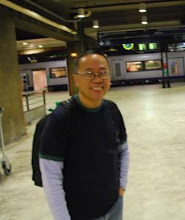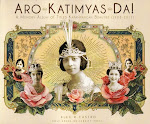 THE SMITHS GO TO ANGELES. Mr. & Mrs. Buford and Billie Smith, of Texas, with son, Eugene, on assignment at Clark Air Base. Longtime friends and tenants of our duplex apartment in Malabanias, Balibago in the 60s.
THE SMITHS GO TO ANGELES. Mr. & Mrs. Buford and Billie Smith, of Texas, with son, Eugene, on assignment at Clark Air Base. Longtime friends and tenants of our duplex apartment in Malabanias, Balibago in the 60s.From the mid 1960s to the early 70s, Angeles, particularly Balibago, enjoyed a boom period as American servicemen poured into Clark Field by the hundreds. The Vietnam War was in full rage at that time, and the base housing facilities simply could not accommodate the overflow of incoming Americans and their families. To cash in on this growing market, many entrepreneurs went on a construction spree, developing whole subdivisions (like Severina Subdivision, Marisol Manor, Marlim Mansions, etc.), apartment complexes and houses for rent to Americans who opted to live off-base.
By chance, my father had a 650 sq. meter lot in Balibago, strategically located in Plaridel, very close to Clark. My mother, on the other hand, had another lot in Abacan, close to her brother’s large property, which had been successfully converted into a compound of apartments rented out to Americans on assignment in Clark. So, my parents joined the bandwagon of builders and had a duplex house made to American specifications on their prime properties.
The picture-perfect duplex in Plaridel was a small neat package with 2 wood floor rooms, a living room, a compact kitchen and a small front yard with flower boxes, ideal for a young family. As soon as the “For Rent” sign was put up, my father was besieged with inquiries from American servicemen—and that’s how we came to have the Smiths and their children, as tenants and eventually, as close family friends.
At home, my Kapampangan father always referred to them at home as “Ismits”, and that’s how we also knew them. From the Christmas cards they regularly sent, I learned that Mr. Smith was named “Buford”, or simply “Chuck” . Mr. Smith and wife Billie, were a tall, strapping pair, quick to smile and blessed with happy dispositions. My mother told me that Mrs. Smith had American Indian blood which accounted for her darker complexion. They were from a place in Texas called Burkburnett, which I always had trouble pronouncing. The Smiths were always invited by my parents to our family parties, and in one particular visit, I met their son, Eugene "Gene" Smith, who was about my age .
I remember that particular visit—I was about 10 or 11—because my father had asked me to keep him company and play with him while he and Ima entertained their friends. Gene was such a hyperactive child; he struck up a chat with me in rapid-fire English which I could hardly comprehend. I took out my second-hand bike and led him to my uncle’s house next door, which had a big cemented yard perfect for biking. As soon as Eugene sat on the bike, he started pedaling away like crazy, making dangerous loops and showing off some stunts. We soon attracted the attention of neighborhood kids who gawked at this boisterous American boy and his chaperone. Of course, Eugene became a sort of a trophy I could show off, and I made sure the local kids knew that, by conversing with him in my best Kapampangan English, within their hearing range. Eugene’s rowdy play came to a stop when he took the bike up a cemented incline and started to careen down at great speed, causing him to fall. Mr. Smith heard our commotion and called his scratched-up son home.
The Smiths lived in that duplex apartment for over 2 years, and every year, after Christmas, my father would help in their annual ‘spring cleaning’. All their usable discards were put in a big cardboard box and taken home. It was always exciting to open that box that held unimaginable second-hand surprises inside and us, siblings, would fight over the contents like mad. I didn’t care much for the American size clothing (my mother went agog over the knitted sweaters), but I went wild over the half-used coloring books, the slightly used toys (I remember a pair of tin wind-up motor cars), the Disney comics and the Mickey Mouse storybook that my elder brother coveted.
On special occasions like Christmas, we would get gifts—everything from American milk brands that came in waxed cartons to gift stockings stuffed with Brach’s candies, caramels plastic toys and licorice sticks. When my father had an extra dollar or two, he would ask his friend to buy a couple of items from the Clark commissary, if at all possible. Of course, he was never refused. We would get chocolates like M&Ms and Kisses, barbecue sauces, Revlon shampoo, cereals and shoestring potatos, never before seen in local stores. In one year, I got a giant box of 64 crayons that came with a built-in sharpener. Wow! I never even imagined that crayon colors such as periwinkle, sea green and gold existed, thinking at that time that this could only be possible in the U.S. of A. For while, I was smitten by the American dream.
So for a couple of years, while the Smiths stayed for their tour of duty, we had a peek of the American life, transplanted in a little duplex apartment along an unpaved road in Balibago. The Smiths even had a second son, Steven, born while on vacation in the States, but brought to the Philippines as an infant. I think Steven’s birth hastened the Smiths’ decision not to extend their stay in Clark. They flew back to the U.S. and shortly, we found another American family as tenants, the Kentalas and their six daughters.
The Smiths, resettled back in Texas, but they kept in touch every Christmas with cards, chatty letters filled with the latest family updates and pictures of the growing family, including the boys, Eugene and Steven. They kept this up without fail every year, until Mr. Smith’s retirement. One of the last letters we received was in the mid 80s, to tell us of Eugene’s forthcoming marriage to a local girl, complete with a newspaper clipping. The letters stopped coming altogether until we completely lost track of them.
But for a few short years in the turbulent ‘60s, we, the Castros and the Smiths, bridged the gaps of race, culture and creed to become true friends—Filipinos and Americans together-- with a genuine sincerity that knew no bounds.








No comments:
Post a Comment